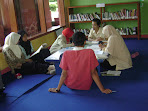Guide to Expressions of Quantity
Posted On Sabtu, 21 Februari 2009 at di 00.59 by Language Access CentreExpressions of quantity are placed before nouns and express 'how much' or 'how many' of something exists. Some expressions of quantity are only used with noncount (uncountable) nouns, others are only used with count (countable) nouns. Some expressions of quantity are used with both noncount and count nouns. Here are some examples:
Count Nouns
both friends
several people
many trees
Both Count and Noncount Nouns
some time / friends
all people / all food
lots of things / money
The chart at the bottom of the page provides an overview of the most common expressions of quantity and the nouns (count or noncount) they proceed. The chart begins with the least amount (0) and ends in the greatest amount (all).
Here are examples sentences of each of these expressions in the order given in the chart. Examples go from the lowest number of amount to the highest number or amount:
Not any - Both Count and Noncount Nouns
I don't have any time this week.
She doesn't have any friends in London.
No - Both Count and Noncount Nouns
Mary has no money to go away on holiday.
I have no friends in Chicago.
One, two, three, etc. - Count Nouns Only
Peter has one car.
Both - Count Nouns Only
Both of my friends live in San Francisco.
A Couple Of - Count Nouns Only
There are a couple of cats in that house.
A Few / Few - Count Nouns Only
There are a few students in the classroom.
She has few friends in New York.
A Little / Little - Noncount Nouns Only
There is a little food left on the table.
There is little time to waste.
Some - Both Count and Noncount Nouns
I've got some extra money saved up in the bank.
She's got some friends in New Orleans.
Several - Count Nouns Only
There are several books on that table.
Much - Noncount Nouns Only
How much time is left?
Many - Count Nouns Only
There aren't many days left until Christmas.
A Lot Of / Lots of - Both Count and Noncount Nouns
We have a lot of rice in the kitchen.
There are a lot of students waiting to take the test.
She has lots of time to get ready.
Jack has lots of friends in Los Angeles.
Plenty Of - Both Count and Noncount Nouns
There is plenty of help available
at the library.
There are plenty of children in need of your help.
A Number Of - Count Nouns Only
She has a number of business contacts in Los Vegas.
Most - Both Count and Noncount Nouns
He has the most time of anyone.
She keeps most receipts on her desk.
Each - Count Nouns Only
Each student must come to class on time.
Every - Count Nouns Only
Every day is important.
All - Both Count and Noncount Nouns
She keeps all oranges in the refrigerator.
We keep all rice in the cupboard.


